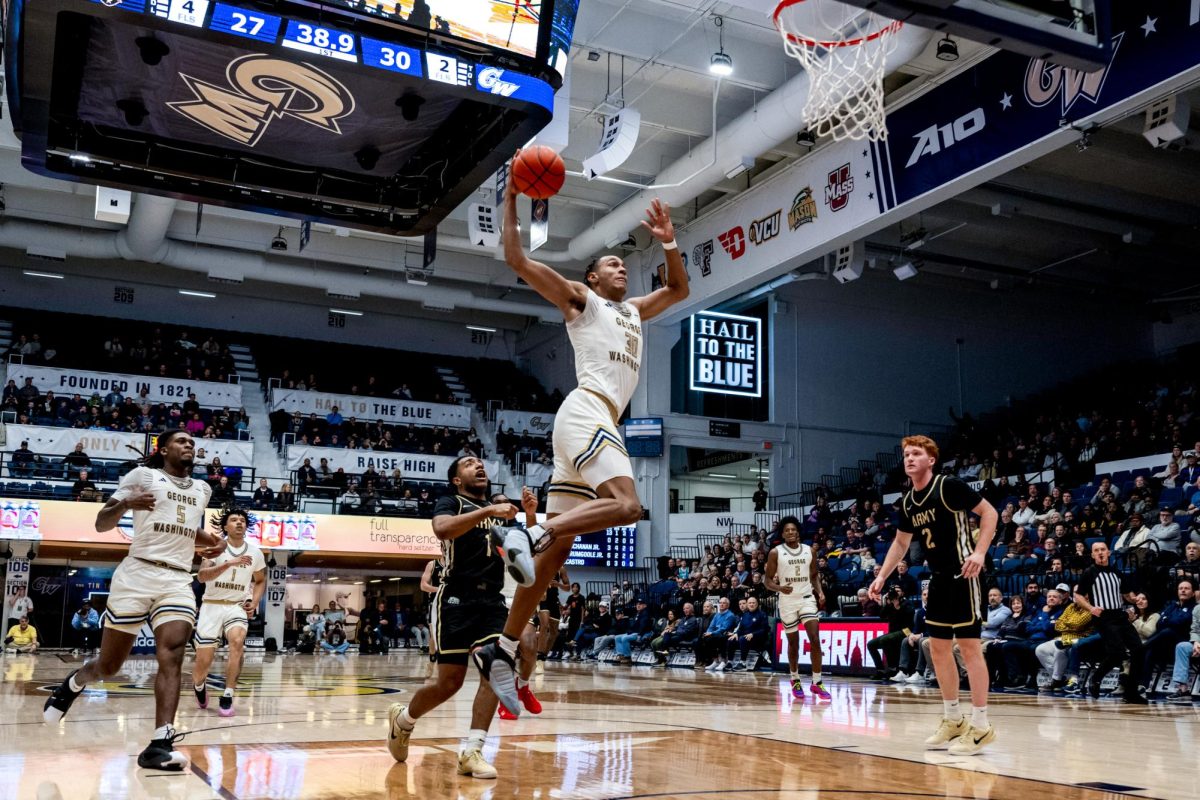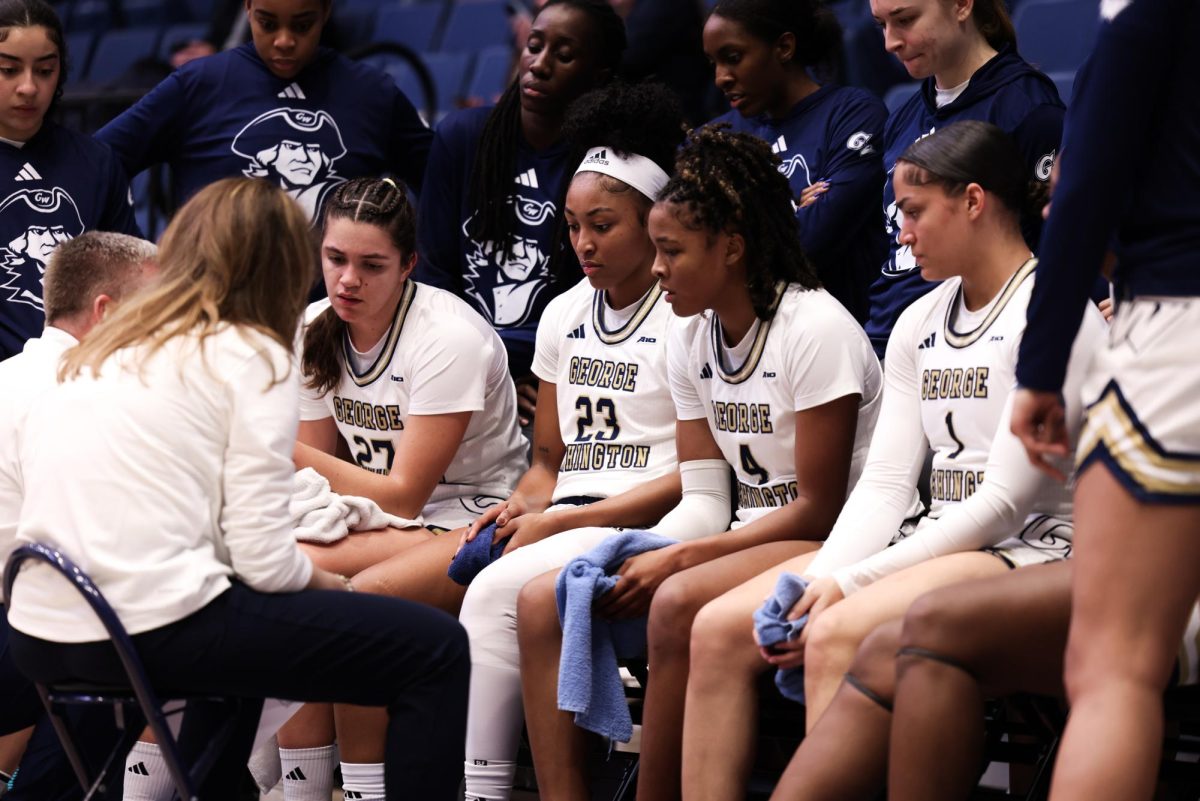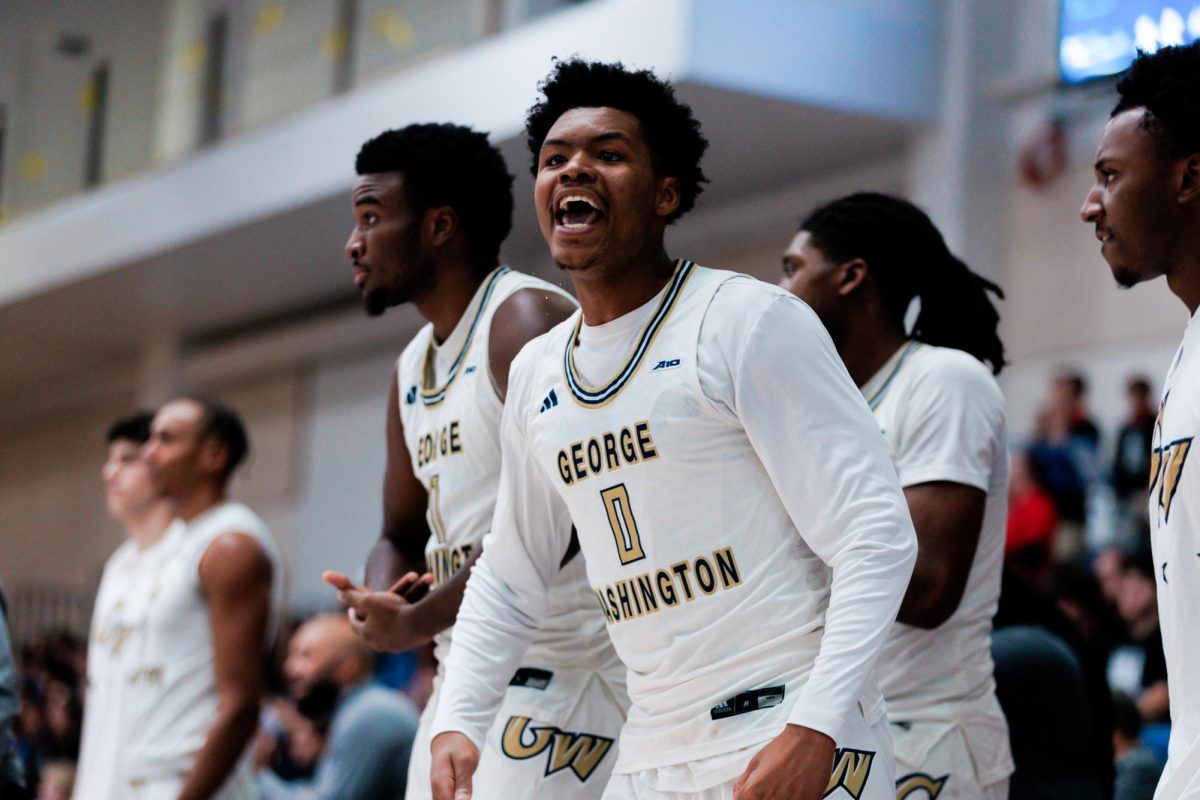On a rainy Friday morning, Brian Ellerbe sits at his desk – comfortably and slightly reclined – with a laptop on either side, smiling. As he speaks, he does not grin once or twice or even occasionally, but practically as a means of punctuation. His lips stretch the square goatee that borders them, easing his words and warming his audience. The tendency seems polished, but genuine – disarming and without dishonesty.
It is this ability to connect with people that brought Ellerbe to this 22nd Street townhouse. In July, he was hired as the men’s basketball program’s newest assistant coach, replacing Darrell Brooks. Brooks left the position this summer to take a head coaching position at Bowie State after having served on head coach Karl Hobbs’ staff for eight seasons.
As is the case with any assistant coach at a Division I program, much of Ellerbe’s job thus far has centered on recruiting – the identifying and, most importantly and exhaustingly, the luring of potential players that is the lifeline of college athletics.
Ellerbe had officially been on the job for less than a week before Chandra Bierwirth, the GW athletic department’s director of compliance, was presiding over him as he took an NCAA exam testing his knowledge of recruiting regulations.
That was at 9:30 a.m., Monday, July 6. When he was done, the score popped up on his screen – there was “a little anxiety there,” he says – telling him he had passed and authorizing him to recruit for GW.
At 11:45 a.m. that same day, fewer than three hours after the test began, Ellerbe was at a gym in Chantilly, Va. – back on the recruiting trail, back in the nomadic life of a college basketball coach, back in the game.
“And from then on,” he says, “it’s been all-out.”
***
When news broke that he had taken a position on Hobbs’ staff, those familiar with Ellerbe’s background wondered where he had been since March 2001, when a steady climb up college basketball’s coaching ranks abruptly ended with a fall from its summit.
For two decades, Ellerbe lived what he calls “the grind:” a day-in, day-out battle to out-work his competitors and build whatever basketball program he was a part of at the time. He slept in his car, bunked at friends’ houses, drove hours upon hours to recruit a prospect only to turn around and drive back that same night because he couldn’t afford a hotel.
“We’re nuts,” he says laughing, referring to himself and his coaching brethren.
Eventually, it paid off. First in 1994, with a head coaching gig at Loyola (Md.) and then, three years later, with the top job at Michigan. His time with the Wolverines began successfully, with a Big Ten tournament title and an appearance in the 1998 NCAA tournament.
But things soon began to turn south on the court and sour off of it. Over the next three years Michigan failed to finish above seventh place in the conference, with its 15-14 record in the 1999-2000 season being the only winning mark in that span.
Meanwhile, Ellerbe grew tired of not only the coaching grind, but the demands and complications of heading up a major program. At the conclusion of the 2000-01 season, Michigan Director of Athletics Bill Martin asked Ellerbe to resign from his position. Ellerbe did so, leaving not only Michigan, but the college coaching scene altogether.
“As you move up, the politics of it become immense,” he explains. “I didn’t like that taste anymore. The game became 5 percent of the job.”
He pauses.
“Those experiences really, really gnaw at you,” he says. “So it was probably really good for me – personally, mentally, psychologically – to just get out.”
***
A few years later, Ellerbe relocated to a Las Vegas suburb and began helping a friend get the western wing of his construction company off the ground. The urban planner in him – he majored in the field during his four years at Rutgers – finally had time to shine. His knowledge helped him with the permitting processes and logistics of contracting and construction. His coaching abilities also came into play, Ellerbe says.
“I didn’t really spend a lot of time learning the detailed intricacies of construction,” he says. “But in terms of building a business, my experience coaching was very, very conducive.”
It was as if he was on the recruiting trail again, soliciting projects and securing deals. “Just a little different clientele,” he jokes.
He had left the basketball grind. But he couldn’t leave the basketball.
His job and his paycheck secured, Ellerbe began fulfilling his passion on the side, consulting high school prospects in the area and helping them navigate the strange and treacherous world of college basketball recruiting.
Having spent so much time on the other end of the equation, Ellerbe knew what coaches were looking for, knew how a player should showcase himself and knew how and why certain student-athletes fit in certain places.
“You just don’t want to see people make really, really bad decisions for their kid,” he says. “Moms, they don’t know. They know their sons, but they don’t know.”
***
Ellerbe is home again, not only in his profession but in his life. A native of Prince George’s County, Ellerbe left the area in 1981 – the only of his family’s 10 children, of which he is the youngest, to do so – and didn’t come back until last fall. His wife, herself from the Washington area, wanted to give birth to her daughter at GW Hospital, just as her mother had done for her, and her grandmother for her mother. Earlier this year, the Ellerbe family welcomed a new baby girl.
The proud father began to re-establish himself on the local basketball circuit, attending various high school games and all-star tournaments in order to keep up with the consulting and stay involved in the game he could never leave. Word began to spread that he was back in town. One thing led to another and he emerged as a candidate – and was ultimately tabbed – to replace the departing Brooks this summer.
In his return to coaching, Ellerbe brings with him a new perspective. He doesn’t sweat the small stuff. He sees how it all connects. He knows how lucky everyone is to be involved.
“It truly is a privilege to play college basketball,” he says. “The things you get to experience… I think the players, coaches and athletic departments take that for granted sometimes.”
More than 14 weeks into his job, it still feels fresh after such an extended hiatus from the grind.
“I still feel like every day is the first day,” he says. “It’s been fun.”
***
Ellerbe is interrupted by the buzz of his BlackBerry – one of two, to be exact – and he gives a curious glance at the display.
“This looks unfamiliar,” he says quizzically. He decides to answer, and on the other end is the mother of a prized prospect, looking for and receiving the sort of counseling at which Ellerbe excels.
“You control the recruiting,” he tells her. “Don’t let the recruiting control you.”
Eventually the conversation ends, but not before Ellerbe is able to find common ground amidst some potentially discouraging news: college basketball’s elite, teams from its Big East and Atlantic Coast conferences, have started to call this prospect too.
Ellerbe is undaunted. If he can get the recruit to campus, he says, then GW will be in the mix alongside the big boys.
“They don’t scare me,” he says, and his lips peel back to bend their black-haired frame once more.






